Jim C. Hines's Blog, page 118
November 12, 2013
The Atrocity Archives, by Charles Stross
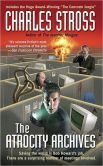 I’ve been wanting to check out Charles Stross‘ Laundry series for a while, and finally had time to read The Atrocity Archives [Amazon | B&N | Mysterious Galaxy]. The tagline is, “Saving the world is Bob Howard’s job. There are a surprising number of meetings involved.” That nicely captures the tone of the book, a blend of Lovecraftian threats from beyond with governmental bureaucracy, complete with budget meetings and petty managerial power struggles.
I’ve been wanting to check out Charles Stross‘ Laundry series for a while, and finally had time to read The Atrocity Archives [Amazon | B&N | Mysterious Galaxy]. The tagline is, “Saving the world is Bob Howard’s job. There are a surprising number of meetings involved.” That nicely captures the tone of the book, a blend of Lovecraftian threats from beyond with governmental bureaucracy, complete with budget meetings and petty managerial power struggles.
Bob is more of a hacker geek than a superhero, and it works well, giving us a reluctant hero who favors brains over brawn. (I have a fondness for that type.) There’s plenty of action, and there were times I found myself struggling to keep up with the plot twists and revelations … fortunately, Bob was struggling right along with me. He’s a sympathetic character, and a good introduction into the world of magic-wielding government spooks and computer-powered rituals.
As for the plot itself, well … Bob gets sent on his first field mission, seeking out a potential contact named “Mo” in the U.S. From there, we get magic terrorists, supernatural (and really nasty) Nazi technology, a bit of romance, and the impending end of the world universe.
It’s quick-paced, with lots of good historical background, a fun hero, and a dry sense of humor that works well to balance out the occasional horrific scenes.
The book also includes the Hugo Award-Winning novella “The Concrete Jungle,” which continues to blend magic and technology in creative and intelligent ways, talks about the real reason for all of those public cameras in London, and tosses Bob into the middle of another nightmare scenario. I wasn’t sure at first what I thought of the revelation of the true villains, but I decided I liked it. It fit well with the world Stross creates.
Also, Bob’s boss Angleton is a scary, scary man.
Short version – I’ve added The Jennifer Morgue, the second Laundry Files novel, to my wish list.
November 8, 2013
Cool Stuff Friday
I’m off to Windycon. Have some cool stuff!
This 4-Year-Old has the Best Lucy Skywalker/Tauntaun Halloween Costume. (Link from The Mary Sue)
How to Toothpaste. Toothpaste art and random surreality. (Link from Foz Meadows)
“A 10-year-old boy in Nova Scotia has become the youngest person to discover a supernova, trumping his sister’s record.” (Emphasis added, because of awesomeness)
Astronaut Luca Parmitano’s Halloween Costume. (Hint: You will believe a man in space can fly.)
The LEGO Movie has a trailer. And Wonder Woman. And Abraham Lincoln in a rocket chair.
Finally, Riccardo Zangelmi built a LEGO interpretation of Escher’s “Relativity.”
November 7, 2013
Windycon Schedule
I’ll be Guest of Honor at Windycon this weekend, which is pretty dang exciting. Windycon is one of the earliest conventions I ever attended. It’s where I met my first editor, where I met my agent, and where the Magic ex Libris series was born. (In the green room, to be specific.) I’ve also started taking the family along to this one, which is a lot of fun.
My schedule for the weekend is:
Friday
7 pm: Opening Ceremonies
9 pm, Room 1602: ISFiC Book Release Party – The Goblin Master’s Grimoire
Saturday
10 am, Ballroom A: Reading (As I don’t seem to have an autographing session, if you’ve got anything you’d like me to sign, I’ll make sure to leave some time after my reading.)
11 am, Lilac D: Trilogy Squared
1 pm, Lilac A: Superheroes of the 21st Century
2 pm, Lilac A: An Author’s Best Friend
7 pm, Lilac A&C: Harassment
8 pm, Masquerade (Yes, I have a costume, and plan on entering the masquerade. This will be my first time. Be gentle!)
Sunday
1 pm, Ballroom C: My Body Doesn’t Bend That Way
2 pm, Ballroom C: Closing Ceremonies
It should be a fun (if busy) weekend.
So, anyone else going to be there?
November 6, 2013
Sandra Tayler Talks About The Strength of Wild Horses
Sandra Tayler is the author of Hold on to Your Horses, a gorgeous picture book about an impulsive child named Amy. From my review of that first book:
One of the most poignant moments in the book is when Amy breaks down and asks, “Why am I always the problem?” For these children (and their parents and caretakers), Tayler’s book provides a way to understand and start to control their impulsive behavior.
I was delighted to find out Sandra was kickstarting The Strength of Wild Horses, a second book about Amy. Like the first book, this one will be illustrated by the marvelous Angela Call. I’m happy to have Sandra here to talk about her hopes and goals for this new book.
You can learn more and support her Kickstarter at http://www.kickstarter.com/projects/1635154756/the-strength-of-wild-horses.
#
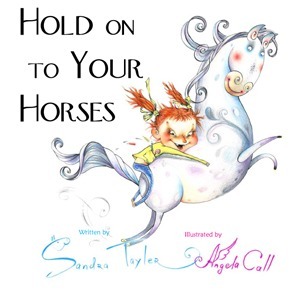 1. You said you wrote Hold on to Your Horses, your first book about Amy, “because [your] daughter needed a story that helped her visualize and control her impulsive ideas.” What prompted you to write The Strength of Wild Horses?
1. You said you wrote Hold on to Your Horses, your first book about Amy, “because [your] daughter needed a story that helped her visualize and control her impulsive ideas.” What prompted you to write The Strength of Wild Horses?
I started seeing the need for a second book almost as soon as the first book was done. My daughter was finally able to visualize her impulsive creativity as something she could control and steer, but then she looked at me one day and told me that sometimes she got tired of steering. “What are wild idea horses good for?” she cried. I had a dozen answers for her, but they were grown up answers. A six year old is not going to be comforted by the fact that some day, when she is all grown up, her headstrong creativity will make her a fantastic project leader in the workplace. I had to find an answer that showed her how wild ideas can make a child’s life better. Strength of Wild Horses is my answer.
2. Has your daughter read the new book? What did she think?
She has and she likes it. I took much longer than I would have liked to find the answer to her question and there were also business and funding issues that delayed the project for six years. My daughter is twelve now and relates to the story in a very different way than she did when she was in Kindergarten, but she loves the way that I lifted some actual events from her life and folded them into Amy’s story. Some of the chaos that Amy creates is based on real life events.
3. I know you as a very loving and dedicated parent, and you’ve blogged about some of the challenges and rewards of being a parent. Can you talk a bit about stories as a way to help children learn and grow?
We all need stories, both adults and children. Stories help us explain–to ourselves–who we are and how to go forward. The right story can completely change how a person views themselves, which is what I accomplished with Hold on to Your Horses. Once my daughter had that story she was able to see that she could have an unfortunate impulse without being a bad person. Even more valuable was her increased ability to choose how to express her ideas so that they didn’t cause problems. Strength of Wild Horses takes that even further, showing that the existence of headstrong ideas can make the world a better place. These are powerful stories to hand to a child who struggles with high energy creativity that gets them in trouble. Over and over again through my parenting I have helped my kids find the stories they needed. I sometimes review books that helped us over on the Hold on to Your Horses facebook page. Stories can change the world by changing the people in it.
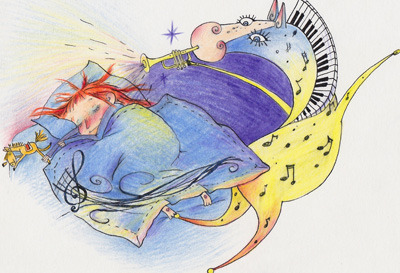 4. Angela Call’s artwork is bright, colorful, and gorgeous. What’s the story of how you brought her into the Horses projects?
4. Angela Call’s artwork is bright, colorful, and gorgeous. What’s the story of how you brought her into the Horses projects?
I wrote Hold on to Your Horses because my daughter needed a story. Then because she was only six, I knew that the story needed pictures. I’m married to a cartoonist, so it seems like that would have an easy solution, except my husband and I both agreed that his art style wasn’t right. Instead we put out the word on the internet that I was looking for an artist. I couldn’t promise that the project would ever make any money, but I did promise that the artist would make half of any profit. I was fortunate that Angela saw the open call and decided to submit. Angela and I have never met in person. We do most of our communication via email.
5. This isn’t your first time working with Kickstarter. Assuming you meet your fundraising goal (and we hope you do!!!), what happens next?
If this project funds it will pay for a print run of 2000 books and cover the costs of Kickstarter, packaging, and postage. I’ve already paid Angela and advance out of pocket. In order for me to get paid, I’ll have to sell enough of those books. I’d like to get paid eventually, but more important is getting to make the book and making it available to people who need the story. If the project does really well, I have other stories to tell and Angela can draw really beautiful pictures…
6. Okay, time for a Very Serious question: why horses as opposed to, say, goblins?
Goblins are amazing and wonderful. Using them for the book was quite tempting, but my daughter loved horses at the time I wrote the story for her. I had to pick the animal which always focused her attention. Being able to tap into the common usage of the phrase “Hold on to Your Horses” was an added bonus.
7. Anything else you’d like to add or talk about?
I’d just like to express sympathy and support to all the parents out there who are struggling to understand their children. I think that is pretty much every parent at some point in their parenting life. Raising kids is hard, particularly when you can see what is coming and you imagine how difficult it could be. Hang in there. Expose your kids to all sorts of stories and pay attention to which stories your child loves. That can be a key of connection and understanding between you if you let it be.
November 5, 2013
Cover Pose Calendar
The 2014 “Year of the Poser” cover pose calendar is now up for sale at the Tinkers’ Pack website.
As with last year’s cover posing fundraiser, my goal this year was to raise additional funds for the Aicardi Syndrome Foundation. Aicardi Syndrome affects 1 in 105,000 girls born in the U.S. It causes brain malformation, visual problems, seizures, developmental delays, and other medical complications. Most research puts the life expectancy for people with Aicardi between 8 and 16 years.
As a special bonus, not only do you get a calendar full of ridiculous poses, but each calendar is autographed both by me and by bestselling author Patrick Rothfuss. (I hadn’t expected Pat to take the time to autograph several hundred calendars, but I’m thrilled that he did!)

My thanks to Pat Rothfuss, Nicole Everard, Kat Lemmer, and everyone at the Tinkers’ Pack, as well as my wife and photographer Amy Hines, my celebrity guest posers John Scalzi, Mary Robinette Kowal, Charlie Stross, and Pat Rothfuss, guest photographer Al Bogdan, and everyone who supported the fundraiser last year and helped us to make the calendar goal.
Supplies are limited, so order fast!
Please spread the word. And if for some reason you don’t feel the need to have a calendar with ME in various awkward and contorted poses but you still want to support the Aicardi Syndrome Foundation, you can do so on their website.
Darkbeast Rebellion, by Morgan Keyes
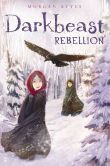 Darkbeast Rebellion [Amazon | B&N | Mysterious Galaxy] is the second book in Morgan Keyes‘ Darkbeast trilogy. (I reviewed the first book last December.)
Darkbeast Rebellion [Amazon | B&N | Mysterious Galaxy] is the second book in Morgan Keyes‘ Darkbeast trilogy. (I reviewed the first book last December.)
In a world where children are bound to magical darkbeasts, intelligent companion animals who are supposed to take their children’s sins and faults into themselves, Keara has defied tradition by refusing to ritually kill her darkbeast Caw. This makes her an outcast and a target for the Inquisitors.
We pick up where book one left off, with Keara, Goran, and Taggart on the run with their darkbeasts, searching for the darker community — others who have chosen to spare their darkbeasts and live in exile. But what they find is not what Keara had expected. She feels out of place and … empty. Day-to-day life in hiding isn’t what she had imagined it would be.
I like old Taggart’s response to Keara’s complaints about boredom and routine:
“Most of life is routine. Routine is what keeps us fed, keeps us safe. Keeps us ready for those few, heart-stopping moments when we must fight for what we believe.”
Let’s just say that as I approach my 13th year working for state government to support my family and my writing, that line resonated.
Without spoiling too much, Keara soon finds herself wishing for boredom. We get a story of betrayal and political intrigue and power struggles and relationship drama and more.
It’s a fun and enjoyable read. As with book one, I liked the characters — particularly Caw, with his unapologetic greed for treats and his unwavering parental love for Keara. It was nice to see more of the politics of the world, and the conflict between the Princeps and the Inquisitor Ducis.
I think the title left me expecting more actual rebellion. There’s a lot of interpersonal conflict and growth, and a fair amount of setup for book three, but don’t pick up the book looking for epic battles between darkers and Inquisitors, with armies of ravens and rats and snakes and spiders swarming over enemy soldiers. Which was disappointing, because I kind of wanted to see that. But given where we end things in this book, I imagine the larger scale conflicts are coming soon.
You’ll want to read Darkbeast first, but if you enjoyed that one, you should pick up the sequel and join me in impatiently waiting for Keyes to finish the third book in the trilogy.
November 4, 2013
Legend of Korra: The Guide
Legend of Korra
2 x 9: The Guide
Full episodes available at Nick.com.
Episode Summary (from the Avatar Wiki): Korra seeks Tenzin’s help to enter the spirit world for the first time.
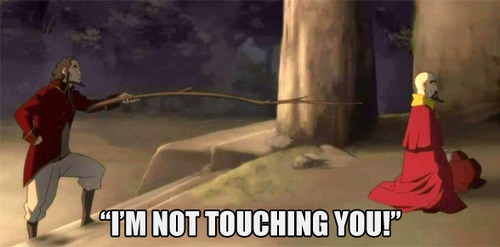
The Good: While not as good as Beginnings, I thought this was one of the better episodes this season. There were little things that made me happy, like Bumi telling tales about beating an earthbender in a rock-throwing contest, and Meelo’s random snot-bubble. Details that make me think someone is remembering to put a little fun and humor back into the show.
And we needed the humor to balance out cranky Tenzin. While his frustration was far from subtle — lack of subtlety seems to be an ongoing theme this season — I liked seeing his frustration at his own failure, his determination to live up to what he believes Aang dreamed for him, and his obvious pain. Yay, character development!
Seeing Jinora playing with the dragonfly-bunny spirits and eventually taking Korra into the spirit world was wonderful. I want more of Jinora, please. (Also more of Bumi and Bum-Jun!)
Korra seems to be in a calmer, more mature place after her Avatar spirit chat, which is nice to see. I enjoyed her recap, too – and Tenzin’s “I knew this would happen!” Korra hasn’t lost her sense of urgency, but she’s no longer charging every which way with that unthinking impulsiveness that kept making things worse. We’ll see how she responds to Mako and Asami, but for now, I’m happy to see her growth. You also see it in her spirit-bending, which seemed more centered and calmer … and actually worked 
Finally, long after I had given up all hope, they humanized the twins! Eska defied her father and took her brother from the spirit world to find a healer. I was so happy about that scene it almost made me forget how terrible the development of those two characters has been up until now. It gave me hope they might even do something cool or interesting with Eska and her brother…
The Bad: Oh, yay. More love triangle tension.
I wish Tenzin would have gotten over himself sooner. Instead of hammering us with his angst, temper that by letting him find joy and pride in his daughter. Celebrate Jinora fulfilling that part of Aang’s dream. I liked Tenzin’s struggle, but I felt like that plotline could have been much stronger.
Mako tries to tell Bolin and Asami about Varrick. They don’t believe him. What a shock.
And once again, it feels like Lin Beifong’s character was wasted. Sigh.
Predictions: Well, we know Unalaq is trying to free Vaatu because Reasons! Korra and Jinora are off to the spirit world to close the southern portal. Mako is under arrest. We’re heading toward a Korra/Unalaq battle in the spirit world. I assume we’ll be seeing the twins turn against their father at some point. What I’m not sure of is how they’re going to bring the two storylines back together. You’ve got Korra and Team Tenzin on the spirits/Unalaq front, and Mako et al. on the Varrick conspiracy front.
I’m guessing Vaatu will get out, and Korra will have to either put him back or — depending on how gutsy the writers are feeling — free Raava to contain him. I hope Mako getting arrested will be enough of a kick-in-the-ass to put an end to the Mako/Bolin fighting. They’ve already done that once this season with the arrest of Korra’s parents, but I’ll take the repetition if it leads us to an actual team again.
Oh, and I’m looking forward to the final episodes being animated by Studio Mir!
November 1, 2013
Cool Stuff Friday
Happy 50% off candy day!
Now have some cool stuff.
A 3-D Printed Dalek Transformer, by Ellindsey. Yes. More, please. (Link provided by temporus.)
Oh look – he made a 3-D Printed TARDIS Transformer, too!!
Princess Dalek!!!!!
I’m rather happy with how my own Halloween costume turned out.
I’m told most things that live in Australia want to make you dead. Then there’s the quokka, aka the Kangaroo Rat. It’s just ridiculously happy to see you. (Warning: Potential cuteness overload.)
Animals with pumpkins, from the annual Pumpkin Bash at Woodland Park Zoo in Seattle. (Link from Seanan McGuire’s Tumblr.)
Internet. In SPACE!!!
Paint War Engagement Photos.
Coma Niddy University presents: How Microorganisms Move.
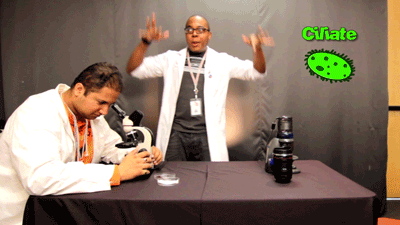
October 31, 2013
“Gypsies” and Other Fantasy Beings
“…Romanies turn up with some frequency — never as characters who happen incidentally also to be Gypsies, but because they are Gypsies, and because they serve a specific purpose. This purpose has, broadly speaking, three manifestations: the Gypsy as liar and thief either of property or (especially) of non-Romani children; the Gypsy as witch or caster of spells; and the Gypsy as romantic figure.” -Ian Hancock
#
The SF/F genre has a particular fascination with “Gypsies.” Maybe it’s the romanticized freedom of the road, the independence of a people who reject the soul-shriveling laws of the civilized world to live however and wherever they choose. Maybe it’s the mysticism, the magic of old Romani women and their curses. Maybe it’s the sex appeal of eager young lasses and virile men. Or maybe it’s just the fashion sense, because scarves and sparklies are cool!
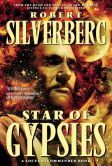 I’m sure most of us recognize that by now, this has become a pretty common trope, even a cliche, in the genre. But hey, they’re fun. They’re part of the history of our genre. And stories never hurt anyone! “Gypsies” are just another fantasy race, like elves and mermaids and dwarves, right? It’s not like we’re talking about real people with real cultures and histories. [/Sarcasm]
I’m sure most of us recognize that by now, this has become a pretty common trope, even a cliche, in the genre. But hey, they’re fun. They’re part of the history of our genre. And stories never hurt anyone! “Gypsies” are just another fantasy race, like elves and mermaids and dwarves, right? It’s not like we’re talking about real people with real cultures and histories. [/Sarcasm]
“The 1997 figure reported by the late Dr Sybil Milton, then senior historian at the U.S. Holocaust Memorial Research Institute in Washington put the number of Romani lives lost by 1945 at ‘between a half and one and a half million.’” (Source)
Have you ever wondered where the term “gypped” came from? Let me put it this way. Saying you got gypped is right up there with saying you got “jewed,” based on the bigoted presumption that those people are all swindlers and cheats and thieves. But it’s not like those stereotypes cause any real harm or damage today, right?
“In the Czech Republic, 79% of respondents to a 2003-04 survey said they wouldn’t want Roma as neighbors.” (Source)
“[P]olice in Liguria gave out preprinted complaint templates for theft, which included a tickbox labelled ‘gypsies’ i.e. offering theft victims the chance to report Roma as the culprits. No other ethnicity was included on the form.” (Source)
Italian Interior Minister Roberto Maroni responded to a wave of violence against the Roma people with the quote, “That is what happens when Gypsies steal babies.” (Source)
Italy’s highest appeals court overthrew the conviction of six people for racially discriminatory propaganda, saying that their aversion to the Roma people, “was not determined by the Gypsy nature of the people discriminated against, but by the fact that all the Gypsies were thieves.” (Emphasis added; Source)
As long as we’re talking, how about a few more examples of prejudice and discrimination?
[image error]
“The European Court of Human Rights has affirmed that school segregation of Romani children (in schools for children with disabilities and in separate schools or classes in mainstream schools) constitutes illegal discrimination in judgments against the Czech Republic (2007), Greece (2008) and Croatia (2010). Despite these rulings, educational segregation of Romani children is systemic in many European countries.” (Source)
“The [Czech] government expressed its regret to Roma women who were sterilized without their consent but admitted the practice may still be taking place.” (Emphasis added; Source)
“[T]he Roma populations face considerable obstacles to the enjoyment of basic rights, notably in the fields of access to health care, housing, education and employment and are often disproportionately affected by poverty. Discrimination and racism, also resulting in violence, remain serious problems throughout the continent, and present a major impediment to the full enjoyment of human rights and fundamental freedoms.” (Source)
Police recently removed a blonde-haired, blue-eyed girl from the Roma family she was with. Because everyone knows those gypsies are child-stealers, right? “DNA tests have proved that a seven-year-old girl taken from a Roma family in Dublin on Monday is their daughter.” (Source)
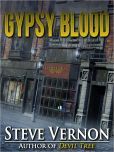 Well, at least this kind of racism isn’t a problem here in the United States, right?
Well, at least this kind of racism isn’t a problem here in the United States, right?
It’s not like we have major newspapers asking “Are the Roma Primitive, or Just Poor?“
Or major television shows telling stories of murderous, child-stealing gypsies.
Or retired police detectives writing articles about how “Gypsies choose a lifestyle of thievery, one that is as natural to them as eating and sleeping.”
I’m not saying science fiction and fantasy is full of people who are actively trying to be racist, or deliberately working to continue the kind of hatred and violence and bigotry described above. I suspect a lot of us, especially in the U.S., barely give it a second thought.
We don’t even realize the term “gypsy” is offensive and/or distasteful to many, basically a racial slur.
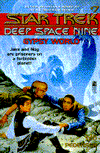 Overt, deliberate, blatant racism tends to be easier to identify and denounce. I doubt most authors are deliberately trying to base their writing on racist stereotypes, any more than I think costume companies said, “Hey, the world doesn’t have enough racism or sexism yet, so let’s do another line of ‘Sexy Gypsy’ costumes!”
Overt, deliberate, blatant racism tends to be easier to identify and denounce. I doubt most authors are deliberately trying to base their writing on racist stereotypes, any more than I think costume companies said, “Hey, the world doesn’t have enough racism or sexism yet, so let’s do another line of ‘Sexy Gypsy’ costumes!”
That doesn’t change the fact that we’re buying into the racism. As authors, we’re perpetuating it. We’re reinforcing the stereotypes and teaching our audience that this is what the Roma people are — that they’re magical, hypersexual thieves.
I remarked this past weekend that I love my SF/F geeks, but we’ve got some issues. Our complicitness in ignoring or erasing real people and replacing them with cliche and stereotype is one of them.
We need to do better.
October 30, 2013
My Keynote from #SiWC2013
While I was at the Surrey International Writers’ Conference last week, I gave my very first Keynote Speech on Saturday night. What follows are my notes for the speech, though I embellished and changed a few things when I was up on stage.
My thanks to Laura Taylor, who was kind enough to record and share the speech on YouTube. It’s broken into three parts.
Part 1
Part 2
Part 3
A number of people asked about the cancer story I mentioned. That story is called “Stranger vs. the Malevolent Malignancy,” and just came out in Unidentified Funny Objects 2. (I’m hoping to get it published online once the exclusivity period in my contract is up.)
It’s four days later, and I’m still a little overwhelmed by the response to my first keynote. (I got saluted by a Mountie!!!)
Thank you all.
#
First off, I’d like to thank Kathy Chung and everyone else for all the work they’ve put into this conference, and for inviting me to be a part of it.
When Kathy emailed and asked me to do a keynote address, my initial address was, “Wait, are you sure you have the right email address?” This happens a lot — and not just to me. It’s imposter syndrome. It happens to brand new authors and big name bestsellers alike…
I’m going to wind back to that in a little bit.
I love this kind of event. I love the energy you create when you pack this many creative minds into one hotel and turn them loose to talk about their passions. I come away from this sort of event both exhausted and completely energized. I’ve got to believe that’s why most of us are here: because we’re passionate about writing. Because we believe stories are important.
Not only that, we believe our stories are important. Lots of people love stories. Far fewer ever try to write their own. And fewer still have the determination to see it through, to keep going, and to come to events like this and commit not just to writing, but to being a writer.
There’s a weird mind game you have to play as a writer. You have to have confidence in your work. You have to believe this thing you’re writing is going to be the best thing the world has ever seen. If you don’t believe in your work, it’s awfully hard to finish, let alone to submit it anywhere.
At the same time, writing is hard. A lot of people talk about how they’d like to write a book someday, as if you just sit down in front of a typewriter and the manuscript fairy swoops in from New York City to blow bestseller glitter up your nose. Heck, the first time I wrote a short story, it was because a friend of mine had been trying to write some fantasy and I figured heck, how hard can it be? I packed it up, mailed it out, and waited for the money to roll in.
It took ten years of practice to learn to write well enough to sell my first fantasy novel. Nobody is born knowing how to write, any more than you’re born knowing how to perform brain surgery. We’ve got to get past the myth of inborn talent and recognize that this thing we’ve decided to do is hard work. It takes time, and there’s no end point to the learning process.
I think there is a manuscript fairy, but he’s not the kind of cute, happy, helpful fairy you see on the Disney channel. He’s an old-school fairy, the kind with just enough power to really mess with us foolish mortals. He hangs out in the shadows of our offices while we work, waiting for us to get to that moment where we say, “Aha! I think I’ve finally got this writing thing figured out!”
That’s when he sneaks over with his sack of brand new challenges and frustrations and dumps them out for you, like a cat leaving little presents on in your shoes. That’s when the imposter syndrome returns.
There are days where you want to throw up your hands and say, “Why do the words all hate me?” “Why am I banging my head against the keyboard when I could be watching Sleepy Hollow?”
But we persevere. We carve out the time to write. We come to conferences. We lock ourselves away with our laptops and our notebooks and our typewriters. We do it because we believe stories matter. Because we believe our stories matter.
I want everyone here to remember one thing: you’re right. Your stories matter.
I can’t write your stories. I don’t have your knowledge, your experience, your passions. I don’t love the same things you do. I don’t see the world in the same way. I don’t have the same relationships, the same values. These are just some of the things that give you your voice as a writer, and your voice matters. Your stories matter.
When I first started trying to write stories that “mattered,” I thought it meant I had to be serious and profound and dripping with angst. The first time one of the people in my writing group told me a story I had written made them cry, I wanted to jump up and do a victory dance. I’d finally done it! I had finally written something good and important!
Forget all that shallow, meaningless crap I had written before. At last, I had become A Writer. An Author.
Forgive my bluntness here, but that’s bullshit. Unfortunately, it’s something we see a lot as writers. This is literature. That’s formulaic hackwork. This story matters. That’s just low-brow escapism. We’ve all seen it. Romance novels. Comics. Twilight.
My second fantasy novel opens with a scene about a goblin suffering from a nasty nose-picking injury. Let’s just say this book did not get reviewed by the New York Times, nor did I get shortlisted for any big literary awards. One review called it “bubblegum fantasy.” I accepted that label at the time. It didn’t bother me because I liked the books, and I was having fun. I didn’t care that I wasn’t writing anything important.
It took me a bit longer to realize that my light-hearted, bubblegum-style trilogy with its scrawny, nearsighted goblin hero and his pet fire-spider mattered. It took an email from a teacher on the west coast, talking about a struggling student who flat-out refused to read. Until she left one of the goblin books sitting conspicuously on her desk. That book – my book – was the first book that connected with this student.
To that one kid, my story mattered. It spoke to him, engaged his imagination and connected with a life in a way that none of those other “important” books had been able to do.
That’s wonderful and humbling.
Your voice matters. Your stories matter, not just because you’re the only one who can write them, but because there’s someone out there who needs the story you can write.
People talk about escapism like it’s a bad thing. Like those stories aren’t as important as gritty books full of Truth and Meaning. But go talk to the woman who’s sitting in the hospital room, waiting to find out if her father survived a triple bypass. Talk to the kid who’s getting the crap kicked out of him at school and at home. Ask them about the value of escapism, about finding a story that takes them away, even if it’s only for a few hours.
I wrote a short story earlier this year – one of the hardest stories I’ve ever done. It was for an anthology of humorous science fiction and fantasy. I wrote about a superhero who’s dying of cancer. Why did I want to write a humorous story about cancer? Because writers are masochists. And because I have a writer friend who’s dying of cancer, another who passed away earlier this year, and a third who was recently diagnosed.
The first time I read that story to an audience, a woman came up to me afterward and told me her father was in the hospital with cancer. She said she thought he’d appreciate the humor in the story. So I handed her the manuscript. She emailed a little while later to say that she’d given it to her mother, that her parents had read it together, and that they had laughed together.1
Don’t tell me stories don’t matter.
What we do isn’t easy. It takes a lot of work and practice and determination. But it’s important. Whether you’re writing thrillers or poetry or romance or science fiction or television scripts, someone out there needs those stories.
And your stories matter.
—
I jumbled a detail or two when I gave the speech. I’ve reread that email, and her parents weren’t in the hospital at the time they read the story. I apologize for messing that up. ↩




